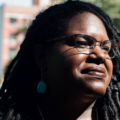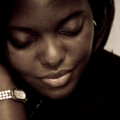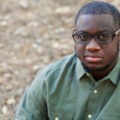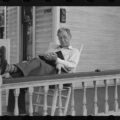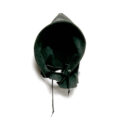Claude McKay Walks in Ferguson
 Claude McKay addresses the Kremlin, 1922
Claude McKay addresses the Kremlin, 1922
Claude McKay, born in Jamaica in 1890, is the first modern master of the sonnet form. Yeats of course had turned out a few—one a classic—as had Pound. Cummings wrote plenty of sonnets, but, because of their idiosyncrasies, they are more complications than masterworks. Wilfred Owen, if he had lived, might have rivaled McKay, as he was disposed to the sonnet and masterful in its usage. The only other serious contender, to my mind, would be Edna St. Vincent Millay, and perhaps later, Berryman. In the Selected Poems, first published in 1953, several years after his death, Max Eastman writes (with what McKay’s biographer, Wayne Cooper, generously describes as an “unconscious condescension”):
Claude McKay was most widely known perhaps as a novelist, author of Home to Harlem, a national best-seller in 1928. But he will live in history as the first great lyric genius that his race produced.
Why then has McKay’s work languished in relative obscurity? Eastman writes in 1953 that his “place in the world’s literature is unique and is assured.” Yet in his fifties, after a decade of illness, McKay sought to end his financial difficulties by taking on employment as a riveter—something he was not physically equipped to handle, and which surely contributed to a stroke at age fifty-three. He had turned down a “sizeable” book advance, explaining, “I haven’t been able to concentrate on a plot. It’s quite impossible when one’s mind is distracted. People can’t realize the state of one’s mind under such conditions, and the few I meet make me angry by telling me how happy I look.” Reading this now, one cannot help but think of the poem that solidified McKay’s contemporary fame, “If We Must Die”:
If we must die, let it not be like hogs
Hunted and penned in an inglorious spot,
While round us bark the mad and hungry dogs,
Making their mock at our accursed lot.
If we must die, O let us nobly die,
So that our precious blood may not be shed
In vain; then even the monsters we defy
Shall be constrained to honor us though dead!
O kinsmen! we must meet the common foe;
Though far outnumbered, let us show us brave,
And for their thousand blows deal one deathblow!
What though before us lies the open grave?
Like men we’ll face the murderous, cowardly pack,
Pressed to the wall, dying, but fighting back!
A sign of its lasting resonance, the poem has transcended race and circumstance (it was written while traveling through Soviet Russia in 1923). Winston Churchill reputedly recited the poem before the House of Commons during World War II. More recently, through protests around the death of unarmed black men in Ferguson, Staten Island, and elsewhere—in too many places and far too often—the poem has experienced something of a resurgence. Recitations have been posted on YouTube. Black America, rightfully, does not forget its origins.
The occasion for “If We Must Die” was the infamous Red Summer of 1919. What began early in the year as a series of terrorist attacks, purportedly by communists—mail bombs were sent to a variety of governmental and business figures—had morphed into a series of riots against black communities by summer. A report produced in October of that year by George E. Haynes, the first African American to earn a PhD in Economics from Columbia University and special assistant to the Secretary of Labor, identified thirty-four such instances across the country. In many cities, attacks against African Americans were led, or permitted, by uniformed whites: military or police officials. Rioting in Chicago—considered the bloodiest of the season—was facilitated as the authorities refrained from acting (from “serving and protecting” as we would say now). Carl Sandburg described it:
The so-called race riots in Chicago during the last week of July, 1919, started on a Sunday at a bathing beach. A colored boy swam across an imaginary segregation line. White boys threw rocks at him and knocked him off a raft. He was drowned. Colored people rushed to a policeman and asked for the arrest of the boys throwing stones. The policeman refused. As the dead body of the drowned boy was being handled, more rocks were thrown, on both sides. The policeman held on to his refusal to make arrests. Fighting then began that spread to all the borders of the Black Belt. The score at the end of three days was recorded as twenty negroes dead, fourteen white men dead, and a number of negro houses burned.
Sandburg’s figures were low: it is now believed that thirty-eight people had died by the time rioting was quelled, of which twenty-three were black. Illinois Attorney General Edward Brundage and State’s Attorney Maclay Hoyne gathered evidence for a Grand Jury investigation.
The summer of 1919 has been referred to as the first occasion when blacks en masse defended themselves against mob violence. Cameron McWhirter’s book Red Summer is subtitled “the awakening of Black America” pointing to the political cohesion and will which was forged at that time. W.E.B. Du Bois wrote of black soldiers returned from fighting in Europe: “By the God of Heaven, we are cowards and jackasses if now that the war is over, we do not marshal every ounce of our brain and brawn to fight a sterner, longer, more unbending battle against the forces of hell in our own land.”
McKay himself did not see any of that violence. As an immigrant, he had not, until that point, closely identify with African Americans. During the summer of 1919, however, that identification forced itself upon him. Wayne Cooper writes:
The poem [“If We Should Die”] eloquently expressed black America’s mood of desperation and defiance that summer. McKay had first read the poem to the men of his dining-car crew. They had reacted with intense emotion. Even the irresponsible fourth waiter, a man afflicted with “a strangely acute form of satyriasis,” had wept. […] McKay had written a poem that immediately won a permanent place in the memory of a beleaguered people. Because of it, American blacks embraced him and have ever since claimed him as one of their own. “Indeed,” McKay eventually concluded, “that one grand outburst is their sole standard of appraising my poetry.” White America has remained less impressed.
McKay, however, held complicated views about man’s inhumanity to man. During the summer of 1918, he wrote in markedly humanist terms of a global struggle:
Looking about me with bigger and clearer eyes I saw that this cruelty in different ways was going on all over the world. Whites were exploiting and oppressing whites even as they exploited and oppressed the yellows and blacks. And the oppressed, groaning under the lash, evinced the same despicable hate and harshness toward their weaker fellows. I ceased to think of people and things in the mass—why should I fight with mad dogs only to be bitter and probably transformed into a mad dog myself? I turned to the individual soul, the spiritual leaders, for comfort and consolation. I felt and still feel that one must seek for the noblest and best in the individual life only: each soul must save itself.
His careful, skeptical, sensitive prose stands in stark contrast to poems like “The Negro’s Friend,” an excoriation of civil rights activists and white liberal reformers alike:
What waste of time to cry: “No Segregation!”
When it exists in stark reality,
Both North and South, throughout this total nation,
The state decreed by white authority.
McKay’s earliest poems are written in dialect while he was still in Jamaica. Paul Laurence Dunbar, born eighteen years before McKay—and dead in 1906 at age thirty-three—set a certain precedence for the success of the style. But McKay’s poetry in standard English far outstrips that of Dunbar. Indeed, no other American writer of the time wrote with such smooth facility. It is no exaggeration to suggest that he invented the modern American iambic pentameter line. But McKay walked the weird bifurcated line between colonized subject and assimilated citizen, both essential to the North American settlement and antithetical to it. Eastman writes:
Claude was born in 1890 in a little thatched farm house of two rooms in the hilly middle country of Jamaica in the West Indies. He learned in childhood how a family of his ancestors, brought over in chains from Madagascar, had kept together by declaring a death strike on the auction block. Each would kill himself, they vowed solemnly, if they were sold to separate owners. With the blood of such rebels in his veins, and their memory to stir it, Claude McKay grew up proud of his race and with no disposition to apologize for his color.
It is an interesting vignette, apocryphal or not—both for what it shows of McKay’s character as well as what it reveals about Eastman’s interpretation of it. The cultural ferment of the twenties was remarkable and the milieu of black artists that came of age then would leave an indelible mark on American culture. McKay, just in his thirties then, stands as a Dante to the Harlem Renaissance: antecedent, predecessor, instigator. Yet, by the time the renaissance came to full bloom, McKay had largely left the scene.
A number of forces have resulted in McKay’s work being less well known than it should be. Poetry has moved from the public domain, so to speak, to the ivory tower. Furthermore, in Richard Wilbur’s phrase, “[t]here is a thoroughly crazy recent idea, sometimes held by bright people, that we have put meter and rhyme forever behind us”. That McKay wrote for a general readership, just at the cusp of Modernism, and wrote in formal verse, puts him out of step with the prevailing literary history of his era—though not entirely.
“A poet writes for people,” Elizabeth Sewell said. “He does not write for professors, English classes, textbooks, examination papers.” While any of these may contribute to “better understanding” of a poem, usually “something else happens: they come between the living man who writes poems and the living beings he writes for, with an icy, sterilizing, or just plain wearisome apparatus of technicality and scholarship.”
Then there’s the question of race: as impossible to ignore as it is foolish to overlook. What may be perceived as a stridency that inheres in “If We Must Die” and “The Negro’s Friend” runs throughout Claude McKay’s poetry, whether it deals directly with race or not. Undoubtedly, lines such as these made professors, publishers, and critics wary:
Oh white man, you may suck up all my blood
And throw my carcass into potter’s field,
But never will I say with you that mud
Is bread for Negroes! Never will I yield.
The white establishment would never raise up McKay, preacher of power and resistance. His sense of the “white man’s menace” sets the stage for Richard Wright’s “huge, implacable elemental design” against which he felt “a longing to attack” decades later. McKay’s formulation makes racism explicit, and seems written for an audience of similar experience, but that fact does not render his poetry less universal: cruelty exists, both in the abstract as an idea to be pondered and as seen in boys (“lynchers that were to be”) dancing “in fiendish glee.”
McKay’s cantankerous personality did not smooth the way for him. “Despite his love for its folk culture,” Cooper writes, “McKay never really learned to function in black American society.” When he protested it was “simply because I have no close academic associates” that he failed to gain employment suitable to his “intellectual attainments”, he was blind to the part he himself played in hampering those relationships that would have helped him. His biographies are replete with instances of him burning bridges before he came to them. Furthermore he did not help his literary career by being absent from the American scene for most of two decades after the Red Summer. He left for England in fall of 1919: the high racial pitch got too hot for him, some of his peers suggested.
Then, as today, money did not come from writing poetry. McKay had patrons, of whom he was unabashedly contemptuous. Needless to say, friends tended to drift away; the loyalty of Max Eastman was a rarity, and even there, signs of strain grew apparent.
McKay had—as Eastman and others knew—a natural lyric genius, but his talents did not translate well to the more lucrative genre of novels. He never could come up with an acceptable plot, and insisted on portrayals of American blacks that were far from complimentary. “A part of him always remained the outside observer and critic,” writes Cooper.
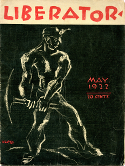
May 1922 Liberator issue, which includes sonnets by McKay
As an editor of Max Eastman’s Liberator, McKay reached the professional apex of his career. Tyrone Tillery, in his biography Claude McKay, describes an incident that would alter McKay’s relation to Eastman and the rest of the white staff:
The Liberator received an invitation extended by the Theatre Guild’s publicity agent to send its drama critic to review Leonid Andreyev’s play He Who Gets Slapped. Since the regular drama critic was away, McKay as coeditor decided to assume the role of theatre critic. In the company of William Gropper, the Liberator’s artist, McKay went to the theater, where he discovered that the management had intended the “first row” tickets to be used only by whites.While the white Gropper was offered a seat near the stage, McKay, who was functioning as the official drama critic, was shunted upstairs to the balcony. Gropper declined to sit alone and accompanied the outraged and terribly hurt McKay to the balcony. “Suddenly,” McKay recalled, “the realization came to me, I had come here as a dramatic critic, a lover of the theater, and a free soul. But—I was abrubtly reminded—those things did not matter. The important fact, with which I was suddenly slapped in the face, was my color. I am a Negro.
“I had come to see a tragic farce—and I found myself unwittingly the hero of one”, McKay wrote, according to Cooper reaching “polemical heights that he never again equaled in his prose”:
Poor painful blackface, intruding into the holy place of the whites. How like a spectre you haunt the pale devils! Always at their elbows, always darkly peering through the window, giving them no rest, no peace. How they burn up their energies trying to keep you out! How apologetic and uneasy they are, yes, even the best of them, poor devils, when you force an entrance, blackface, facetiously, incorrigibly smiling or disturbingly composed. Shock them out of their complacency, blackface, make them uncomfortable, make them unhappy! Give them no peace, no rest. How can they bear your presence, blackface, great unspeakable ghost of Western civilization.
Perhaps his status as an outsider had kept him from feeling the full force of what black America had been facing all along. Needless to say, the incident shook him profoundly, and he resigned his editorship. McKay’s last article for the Liberator, published in August 1922, warned, “This racial question may be eventually the monkey wrench thrown into the machinery of the American revolutionary struggle. The Negro radical wants more than anything else to find in the working class movement a revolutionary attitude toward the Negroes different from the sympathetic interest of bourgeois philanthropists and capitalist politicians.” In London, he had worked with Sylvia Pankhurst’s Worker’s Dreadnought, a radical newspaper of the working-class movement. He would retreat to Russia, and not return to Harlem until 1934.
McKay, like so many others, initially had high hopes for the Russian experiment. He was impressed by Lenin. Trotsky was responsive to McKay’s assessment that “the greatest difficulty that the Communists of America have to overcome” was “the fact … that they first have to emancipate themselves before they can be able to reach the Negroes with any kind of propaganda.” Later he would say, “I went into Russia as a writer and a free spirit and left the same, because I was convinced that however far I was advanced in social ideas, if I could do something significantly creative as a Negro it would mean more to my group and the world than being merely a social agitator.” If a “word on the communist side” would have raised him from poverty, as Eastman suggested, he not only refused to speak it: he grew virulently anti-communist, going on the attack even when there was no personal benefit in doing so.
Back in America in 1934, following brief stints in France and Morocco, McKay found that the Harlem literary movement had passed into the hands of a younger generation. During the expatriate years, when he might have shepherded his literary career forward at home, he was occupied himself with projects that never seemed to come to fruition. In 1940, McKay became a naturalized United States citizen as well as a fervent Catholic, relocating to Chicago until his death in 1948.
McKay once disparaged Wright that “he knew from which side his bread was buttered”: a given individual’s stance in relation to the ruling powers might run the gambit, but McKay remained ever inflexible. His acute moral vision, though it changed over the course of his life, would be welcome today. Today, as colonialism’s ubiquitous tentacles reach inward, and one’s placement within the corporate structure—privately-owned corporations seen as controlling the military-industrial-congressional complex, not governments—guarantees “freedom.” The names and faces change (if not the general hue), but the power dynamics are not so different.
The hundredth anniversary of the Red Summer is fast approaching, and it seems little progress has been made toward racial or economic justice. It remains to be seen whether great poetry will arise from our current moment of social unrest. Of course, the production of great poetry, and even great literary reputations, is really beside the point. Poetry will make its own place; form and mastery will reveal itself. Some will even be remembered, if not always the right ones.
McKay’s ghost may not walk the halls of academia, but it walks in Ferguson, in Staten Island, on the Washington mall. His poetry is not the sort that lauds victimhood. Confronted with the worst forms of violence, intolerance, and abuse, his poems demands dignity.
About David X. Novak
David X. Novak is a poet and playwright living in Chicago. His books include Against Holy War and Sonnets, published by Non Fit Press, as well as several titles at Lulu.com. He is a member of The Society of Midland Authors, and a former contributing editor for The Chicago Poetry Letter News.

